英语词汇学chapter1 vocabulary
英语词汇学-chapter 1
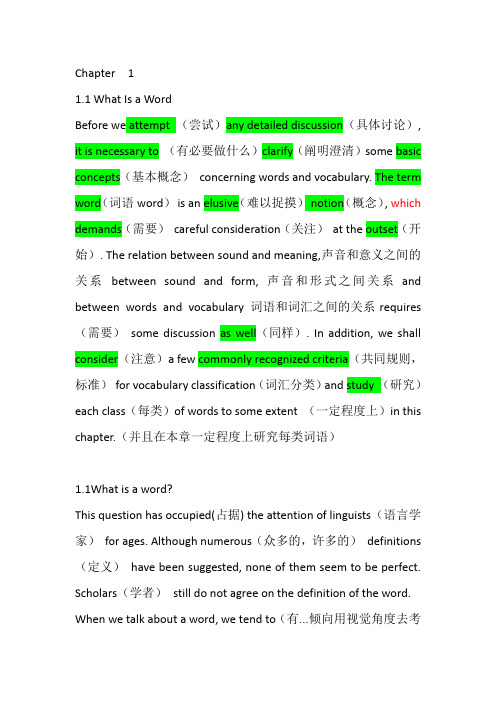
Chapter 11.1 What Is a WordBefore we attempt (尝试)any detailed discussion(具体讨论), it is necessary to (有必要做什么)clarify(阐明澄清)some basic concepts(基本概念)concerning words and vocabulary. The term word(词语word)is an elusive(难以捉摸)notion(概念), which demands(需要)careful consideration(关注)at the outset(开始). The relation between sound and meaning,声音和意义之间的关系between sound and form, 声音和形式之间关系and between words and vocabulary 词语和词汇之间的关系requires (需要)some discussion as well(同样). In addition, we shall consider(注意)a few commonly recognized criteria(共同规则,标准)for vocabulary classification(词汇分类)and study (研究)each class(每类)of words to some extent (一定程度上)in this chapter.(并且在本章一定程度上研究每类词语)1.1What is a word?This question has occupied(占据) the attention of linguists(语言学家)for ages. Although numerous(众多的,许多的)definitions (定义)have been suggested, none of them seem to be perfect. Scholars(学者)still do not agree on the definition of the word. When we talk about a word, we tend to(有...倾向用视觉角度去考虑)think in visual terms. In this line(在这个角度)a word can be defined as a meaningful group of letters printed or written horizontally across a piece of paper. As defined in terms of spoken language, a word is viewed as a sound or combination(集合体)of sounds which are made voluntarily with human vocal equipment (由一个人的发音器官自由的发出的). According to semanticists (语义学者), a word is a unit of meaning(一个词是一个意义单位). Grammarians(语法学家), however, insist that a word be a free form(自由形式)that can function(作用)in a sentence, etc. To sum up, the definition of a word comprises the following points:1)a minimal free form of a language;一个最小的自由形态2)A sound unity;一个发音的集合体3)A unit of meaning;一个意义单位4)A form that can function alone in a sentence.能独自影响句子的形式。
英语词汇学第一章
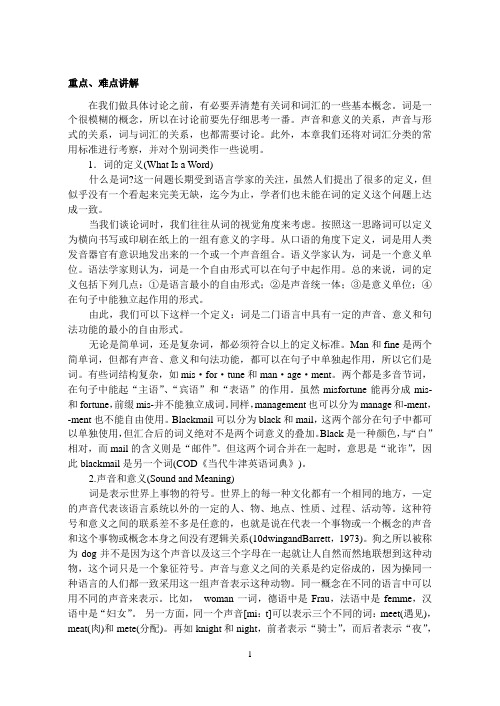
重点、难点讲解在我们做具体讨论之前,有必要弄清楚有关词和词汇的一些基本概念。
词是一个很模糊的概念,所以在讨论前要先仔细思考一番。
声音和意义的关系,声音与形式的关系,词与词汇的关系,也都需要讨论。
此外,本章我们还将对词汇分类的常用标准进行考察,并对个别词类作一些说明。
1.词的定义(What Is a Word)什么是词?这一问题长期受到语言学家的关注,虽然人们提出了很多的定义,但似乎没有一个看起来完美无缺,迄今为止,学者们也未能在词的定义这个问题上达成一致。
当我们谈论词时,我们往往从词的视觉角度来考虑。
按照这一思路词可以定义为横向书写或印刷在纸上的一组有意义的字母。
从口语的角度下定义,词是用人类发音器官有意识地发出来的一个或一个声音组合。
语义学家认为,词是一个意义单位。
语法学家则认为,词是一个自由形式可以在句子中起作用。
总的来说,词的定义包括下列几点:①是语言最小的自由形式;②是声音统一体;③是意义单位;④在句子中能独立起作用的形式。
由此,我们可以下这样一个定义:词是二门语言中具有一定的声音、意义和句法功能的最小的自由形式。
无论是简单词,还是复杂词,都必须符合以上的定义标准。
Man和fine是两个简单词,但都有声音、意义和句法功能,都可以在句子中单独起作用,所以它们是词。
有些词结构复杂,如mis·for·tune和man·age·ment。
两个都是多音节词,在句子中能起“主语”、“宾语”和“表语”的作用。
虽然misfortune能再分成mis-和fortune,前缀mis-并不能独立成词。
同样,management也可以分为manage和-ment,-ment也不能自由使用。
Blackmail可以分为black和mail,这两个部分在句子中都可以单独使用,但汇合后的词义绝对不是两个词意义的叠加。
Black是一种颜色,与“白”相对,而mail的含义则是“邮件”。
[英语考试]高等教育自学考试英语词汇学第一章到第八章必背考点
![[英语考试]高等教育自学考试英语词汇学第一章到第八章必背考点](https://img.taocdn.com/s3/m/d2891ed3a8956bec0875e307.png)
content words and functional words
• By notion,words can be grouped into content words and functional words.
• Content words (notional word) – denote clear notions.
Non-basic vocabulary --
• (1)Terminology(术语) • (2)Jargon(行话) • (3)slang(俚语) • (4)Argot(暗语) • (5)Dialectal words(方言) • (6) Archaisms(古语) • (7) Neologisms(新词语)
• There is no logical relationship between
the sound and meaning. • The relationship between them is
arbitrary and conventional.
relationship between the sound and form
• In the earliest stage of English,the written
form agreed with the oral form.
• In other words, the sound was similar to
the form.
• The difference between sound and form result from 4 major factors.
which can be grouped into
an Eastern set, and a Western set.
英语词汇学-第一章

语素是音义相结合的最小的语言单位。 一般地说,一个语素就是一个音节,书面上就是一个汉字,有时侯还是一个词。但是音节是从语音学角度分析的结果,文字是书面记录的符号,语素则是语言中构词的基本成份,词是指音义相结合的能够独立运用的最小的语言单位。这四者角度不同,并不是一回事。 1、同一个汉字,可以代表不同的语素。 汉字虽然相同,但读音不同:会议/会计 汉字和读音都相同,但是词性不同:老人/老虎/老是捣乱 汉字、读音和词性都相同,但是意义不同:公家/公牛 2、汉语的语素绝大多数是单音节的,但有时侯,一个汉字并不代表一个语素,只代表一个音节,也就是说,一个语素也可以是两个以上音节。 连绵词:磅礴;口语词:尴尬;音译词:咖啡,奥林匹克 3、有时侯,一个汉字在不同场合,有的是语素,有的不是语素。 马匹(语素)/马达(非语素) (邵敬敏,现代汉通论,上海教育出版社,2001,P113-4)
2
Sound and meaning
Sound and meaning
This symbolic connection is almost always arbitrary. There is no logical relationship between the sound which stands for a thing or an idea and the actual thing and idea itself. Lodwig and Barrett, 1973
Why the written form is not always similar to the oral form?
The development of the language letters from Romans for 46 sounds in English The pronunciation has changed more rapidly than spelling over the years. Some of the differences were created by the early scribes.
英语词汇学Chapter1
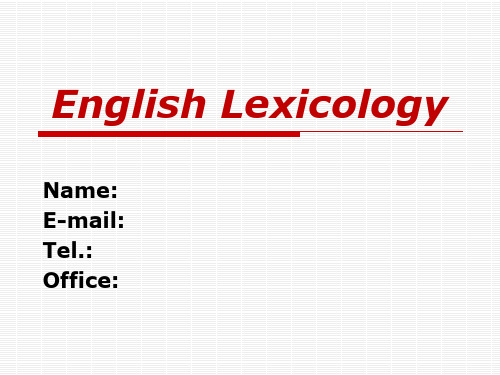
Main Contents
Totally 12 chapters As for chapter
Introduction to Modern English Lexicology)。北京: 北京师范大学出版社。
❖ Nation, I. S. P. 1990. Teaching and Learning Vocabulary. Boston: Heinle & Heinle.
❖ Nation, I. S. P. 2001. Learning Vocabulary in Another Language. Cambridge: CUP.
1,2,3,6,7,9,10,11,12, one chapter each week; As for chapters 4, 5, 8, 2 weeks for each chapter.
Evaluation Procedure
Classroom Principles 1 Never coming late (at least earlier than me) 2 Never using phones in my class Evaluation 1 Attendance 10% 2 Classroom participation 20% 3 Mid-term exam (Oct. 21) 20% 4 Final exam (Dec. 23) 50%
English Lexicology
Name: E-mail: Tel.: Office:
Course Description
英语词汇学复习提纲
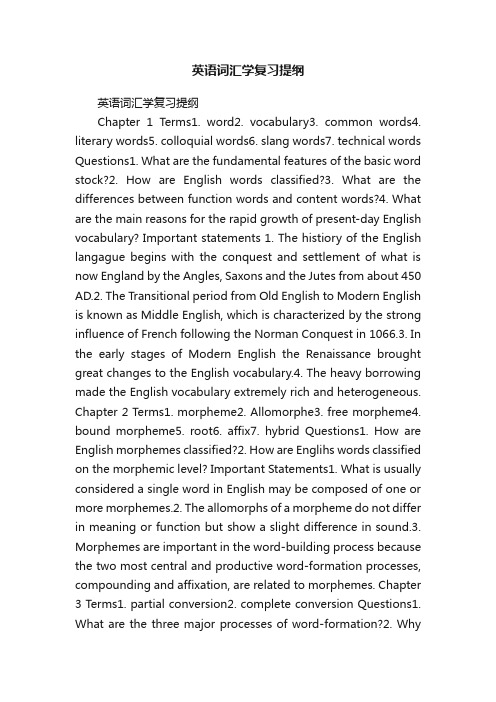
英语词汇学复习提纲英语词汇学复习提纲Chapter 1 Terms1. word2. vocabulary3. common words4. literary words5. colloquial words6. slang words7. technical words Questions1. What are the fundamental features of the basic word stock?2. How are English words classified?3. What are the differences between function words and content words?4. What are the main reasons for the rapid growth of present-day English vocabulary? Important statements 1. The histiory of the English langague begins with the conquest and settlement of what is now England by the Angles, Saxons and the Jutes from about 450 AD.2. The Transitional period from Old English to Modern English is known as Middle English, which is characterized by the strong influence of French following the Norman Conquest in 1066.3. In the early stages of Modern English the Renaissance brought great changes to the English vocabulary.4. The heavy borrowing made the English vocabulary extremely rich and heterogeneous. Chapter 2 Terms1. morpheme2. Allomorphe3. free morpheme4. bound morpheme5. root6. affix7. hybrid Questions1. How are English morphemes classified?2. How are Englihs words classified on the morphemic level? Important Statements1. What is usually considered a single word in English may be composed of one or more morphemes.2. The allomorphs of a morpheme do not differ in meaning or function but show a slight difference in sound.3. Morphemes are important in the word-building process because the two most central and productive word-formation processes, compounding and affixation, are related to morphemes. Chapter 3 Terms1. partial conversion2. complete conversion Questions1. What are the three major processes of word-formation?2. Whyare the criteria of a compound relative? Important Statements1. There are varioius ways of forming words, but by and large, the various processes can be classified on the basis of frequency of usage, into major or minor processes.2. Any rule of word formation is of limited productivity in the sense that not all words which result from the applicationn of the rule are acceptable; they are freely acceptable only when they have gained an institutional currency in the language.3. Prefixes modify the lexical meaning of the base. They do not genearlly alter the word-class of the base.4. Suffixes usually change the word-class of the base. Chapter 4 Terms1. blending2. back-formation3. clipp ing4. neoclassical formation Questions1. What are the differences between initialisms and acronyms? Important Statements1. On the whole, clipped words are used in less formal situations than their full-length equivalents.2. Most of the blends are related to daily life.3. The majority of backformed words are verbs.4. Reduplicatives are characterized by being rhymed or alliterated.5. The majority of neoclassical formations are scientific and technical.6. Genuine coinage is rare.7. Some new words are coined by analogy. Chapter 5 Terms1. motivation2. denotative meaning3. connotative meaning4. stylistic meaning5. affective meaning Questions1. What is the relationship between word form and its senses?2. What are the main types of word meaning? Important Statements1. The test of a genuinely onomatopeic word is its intelligibility to a foreigner who has no knowledge of the language in question.2. Denotative meaning is the central factor in linguistic communication.3. Lexical meaning is dominant in content words, whereas grammatical meaning is dominant in funciton words. Chapter 6 Terms1. radiation2. concatination3. prima ry meanin4. central meaning5. perfect homonyms6.homophones7. homographs Important Statements1. One-meaning words are very rare. They are very often scientific terms.2. It may be said that polysemy is the rule and monosemy is the exception.3. In some cases, the primary meaning and the central meaning coincide.4. Polysemic words and homonymous words are not only good candidates for humor, they can also produce other effects such as irony or heightened dramatic power. Chapter 7Terms1. complete synonyms2. relative synonyms3. hyponymy4. marked member5. unmarked member Questions1. In what respects do synonymous words differ? Important Statements1. An agreement in denotation is the most important criterion of synonymy.2. Two words aretotally synonymous only if they are fully identical in meaning and interchangeable in any context without the slightest alteration in connotative, affective and stylistic meanings.3. It is important to note that two forces militate against complete synonymy: vagueness of word meaning,and connotative, stylistic and affective meanings that cluster around words.4. In most cases the native word is more spontaneous, more informal and unpretentious, whereas the foreign word is learned, abstract or even abstruse.5. In the double scale pattern of synonyms the native term usually sounds warmer and more homely than its foreign counterpart.6. In the triple scale pattern of synonyms the difference in tone between the English and the French words is often slight; the Latin word is generally more bookish.7. Synnonyms are useful for avoiding repetition and for achieving precision in meaning and variety in style.8. Lexical antonymy is often stronger than syntactic negation.9. This semantic category obviously overlaps with hyponymy: both are involved with forming relaionships between words in the same general area ofmeaning. For parctical purposes, in the case of hyponymy, one should pay attention to the question of which specific term to use, while in the case of semantic field, one’s attention should be turned toward the highly probable collocations the words of each semantic field have in common. Chapter 8 Terms1. linguistic context2. ambiguity Questions1. What are the different types of context?2. What are the functions of context in determination of word meaning? 3. What are the different types of ambiguity? Important Statements1. When we say that the context determines the sense we mean not that it imposes a sense but that it selects one that is already there.2. Words rarely can be equated on a one-to-one basis between two languages. Chapter 9 Terms1. historical cause of changes in word meaning2. social cause of changes in word meaning3. linguistic cause of changes in word meaning4. psychological cause of changes in word meaning5. metaphor6. metonymy Questions1. What are the mian causes of changes in word meaning?2. What are the tendencies in semantic change? Important Statements1. Usually a literal meaning of a word remains along with a new metaphorical one.2. Broading speaking, change of meaning refers tothe alteration of the meaning of existing words, as well as the additionnn of new meaning to established words. Chapter 10Terms Idiom Question What points should we attention to if we want to use idioms appropriately? Chapter 11 Questions1. What are three stages in the growth of American English?2. What are the characteristics of American English? Chapter 12Terms1. prescriptive dictionaries 2. descriptive。
英语词汇学知识点整理
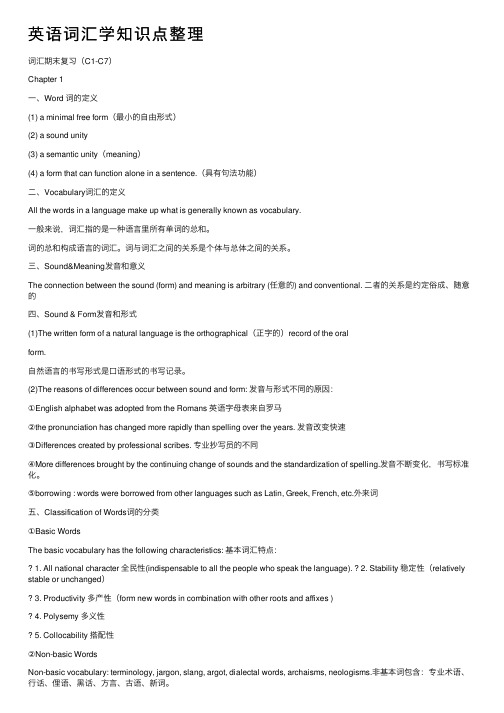
英语词汇学知识点整理词汇期末复习(C1-C7)Chapter 1⼀、Word 词的定义(1) a minimal free form(最⼩的⾃由形式)(2) a sound unity(3) a semantic unity(meaning)(4) a form that can function alone in a sentence.(具有句法功能)⼆、Vocabulary词汇的定义All the words in a language make up what is generally known as vocabulary.⼀般来说,词汇指的是⼀种语⾔⾥所有单词的总和。
词的总和构成语⾔的词汇。
词与词汇之间的关系是个体与总体之间的关系。
三、Sound&Meaning发⾳和意义The connection between the sound (form) and meaning is arbitrary (任意的) and conventional. ⼆者的关系是约定俗成、随意的四、Sound & Form发⾳和形式(1)The written form of a natural language is the orthographical(正字的)record of the oralform.⾃然语⾔的书写形式是⼝语形式的书写记录。
(2)The reasons of differences occur between sound and form: 发⾳与形式不同的原因:①English alphabet was adopted from the Romans 英语字母表来⾃罗马②the pronunciation has changed more rapidly than spelling over the years. 发⾳改变快速③Differences created by professional scribes. 专业抄写员的不同④More differences brought by the continuing change of sounds and the standardization of spelling.发⾳不断变化,书写标准化。
词汇学第一章 The Basic Concepts of Words and VocabularyPPT
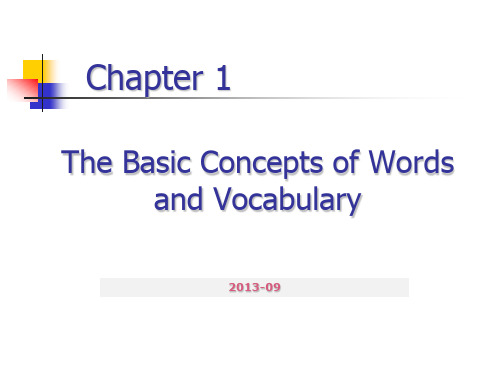
1.4 Sound and Form
Task 1 Say the following words by yourself.
cough
thought
though
thorough
tough
through
Question: why is there the disparity?
The international reason Changes Borrowings
1.3 Sound and Meaning
In how many languages do you know the name of the animal in this picture?
Task 1 Say the name of the animal in
as many languages as you can.
content words and which are functional words? denote never and run notion upon seven Christmas have would
1.5.3 Native words & borrowed words
Task
Guess whether the statements are true or false.
non-basic vocabulary
Not all the words of the basic word stock have these features.
Non-basic vocabulary include:
Terminology 专业术语 Jargon 行话 Slang 俚语 Argot 隐语 Dialectal words 方言词 Archaisms 古词语 Neologisms 新词语
- 1、下载文档前请自行甄别文档内容的完整性,平台不提供额外的编辑、内容补充、找答案等附加服务。
- 2、"仅部分预览"的文档,不可在线预览部分如存在完整性等问题,可反馈申请退款(可完整预览的文档不适用该条件!)。
- 3、如文档侵犯您的权益,请联系客服反馈,我们会尽快为您处理(人工客服工作时间:9:00-18:30)。
A GENERAL SURVEY OF ENGLISH VOCABULARY
1
Outline
1.1 An overview of English vocabulary 1.2 Development of English vocabulary 1.3 Classification of English vocabulary Summary
2
1.1 An overview of English vocabulary
• What is a word?
– The minimal free form of a language, which has a given sound, meaning and syntactic function.
8
1.2 Development of English vocabulary
• The World Languages
– It is estimated that there are about 5000 languages all over the world, which can be grouped into about 300 language families, such as Sino-Tibetan Family, IndoEuropean Family, Altaic Family, and so on.
sБайду номын сангаасntences clauses phrases words morphemes
4
• All the words in a language together constitute what is known as its vocabulary.
5
Lexicology: What is lexicology?
9
1.2.1 Historical development of English vocabulary
• The history of the English language is divided into three periods. – Old English (449-1100) – Middle English (1100-1500) – Modern English (1500-present)
lexicology
lexic-
-ology
Lexicon lexis
vocabulary
eg. biology psychology …
Briefly, it is the “science of the word”, and a branch of linguistics dealing with vocabulary of a language.
• Words are formed by morphemes
– Bloomfield distinguishes between two types of linguistic forms: free form and bound form ( 自由形位 和粘附形位)
3
• The term word refers to the fundamental unit of a given language, with sound and meaning( lexical and grammatical) , capable of performing a given syntactic function(句 法功能)(a word acts as a structural unit of a sentence).
10
• The Old English (450-1100)
– The history of the English language begins with the conquest and settlement of what is now England by the Angles, Saxons, and the Jutes from about 450 AD. The language they spoke was Anglo-Saxon, which replaced the Celtic spoken by the former inhabitants Celts.
study the lexis in a special language
7
Notes: lexis
• “词汇学” 可以定义为 “对某一种语言的词汇 (lexis)的研究” 。
• “词汇” 在英语里可以用vocabulary、 lexis和 lexicon来表示 ,三个术语大致上是同义的 ,但是 ,vocabulary比较口语化、lexicon比较学术化、 而 lexis界乎两者之间。(汪榕培)
– The vocabulary of the Old English consisted mainly of Anglo-Saxon words, 85% of which was no longer in use now.
– Old English was rather different from Modern English in pronunciation, vocabulary and grammar.
– Chinese is a member in the Sino-Tibetan Family, while English is a member in the Indo-European Family.
• the criteria to divide language families ?
– 1. the basis of similarities in their basic word stock – 2. grammar
6
Lexicology
the study of the lexis in human language
(Howard Jackson & Etienne Zė 2001, 陆国强 1999, et.al)
general lexicology & special lexicology
study the universal principles
